#_uuid:760ceaab-f3a6-3e90-a9a4-9b99fb20274d
Explore tagged Tumblr posts
Text
Meet the Democratic superlawyer who could save Jared Kushner
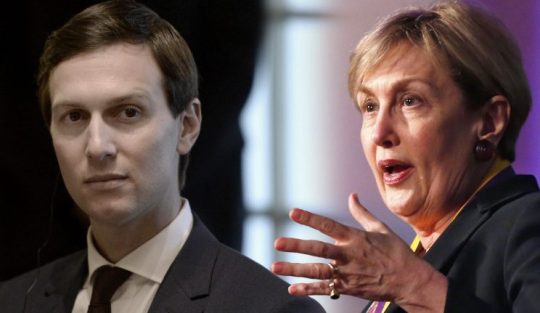
White House senior adviser Jared Kushner and former U.S. Deputy Attorney General, Jamie Gorelick. (Photo illustration: Yahoo News; photos: Olivier Douliery-Pool/Getty Images, Sue Ogrocki/AP)
If Hillary Clinton were president right now, Jamie Gorelick might have been her attorney general.
Instead, Gorelick — a Democratic power player who served as deputy attorney general under Bill Clinton and raised more than $100,000 for Hillary in 2016 — could wind up serving as Jared Kushner’s savior.
Gorelick, as you may have noticed from any number of recent news reports, is Kushner’s lawyer. And Kushner, as you may have also noticed, is someone who is going to be spending a lot of time talking to his lawyer over the next several months.
Federal investigators are now focusing on Donald Trump’s son-in-law and top White House adviser after he failed to disclose several meetings with Russian officials and reportedly endeavored to establish a secret backchannel to the Kremlin during Trump’s transition — which means that Gorelick, who initially signed on to help Kushner and his wife Ivanka Trump, sort through various nepotism and conflict-of-interest concerns, is suddenly responsible for keeping the crown prince of Trump World out of much more serious trouble.
This odd coupling has attracted considerable attention — much of it negative — on both sides of the political peanut gallery, with conservatives warning Kushner to steer clear of “swamp queen” Gorelick and progressives accusing the Clintonista of assisting an administration they abhor.
“Hey Jamie Gorelick, you’ve just pored [sic] that ‘Complicit’ perfume on yourself,” fellow Democrat Hillary Rosen tweeted in March. (Rosen was alluding to a recent “Saturday Night Live” sketch about an Ivanka-branded scent.)

In an interview with Yahoo News, Gorelick admits that “it hurts my feelings when people I otherwise like say things like that.”
But while “I can understand the criticism,” she adds, “I just don’t agree with it.”
The truth, according to those who know her best, is that Gorelick (pronounced Guh-REH-lick) is neither a Democratic plant nor a Trumpian turncoat. They say she is a rarer species altogether, at least in today’s overly polarized, ultra-specialized Washington, D.C. — the last, perhaps, of a dying breed of Beltway superlawyers who spent much of the 20th century leveraging their broad experience and deep connections to become all-purpose political fixers for members of both parties.
“I handle big messes,” Gorelick says. “I consider this the best tradition for lawyers in Washington and I have tremendous respect for what these [superlawyers] did in their careers. I think of myself as having a similar point of view.”
The D.C. superlawyers were “the ultimate ‘go-to guys,’” as the Washington Post’s David Ignatius once put it, “who could get a bill passed or a presidential appointment scuttled or a secret deal negotiated.”
Members of this mandarin class included Clark Clifford, who counseled all four Democratic presidents of the Cold War era; Tommy “the Cork” Corcoran, the first of the modern lobbyists; Robert Strauss, who advised and both Republican and Democratic presidents over three administrations; and the most legendary superlawyer of them all, Edward Bennett Williams.
“Jamie Gorelick is a flashback to an earlier time,” says Williams’s authorized biographer Evan Thomas, who in his 1991 book The Man to See, chronicled Williams’s inexorable rise and decades-long reign as king of the Washington establishment — and who knows Gorelick from his days as Newsweek’s Washington bureau chief. “If Williams liked to be the man to see, then Jamie likes to be the woman to see.”
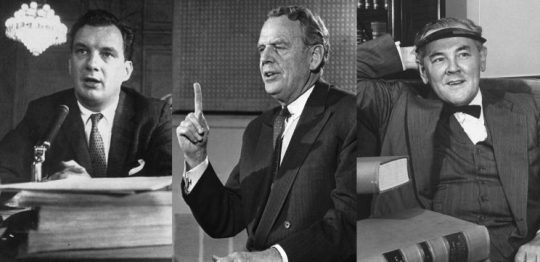
Attorney Edward B. Williams in 1958; former Defense Secretary Clark Clifford in 1972; and, attorney Tommy “the Cork” Corcoran in 1946. (Photos: Paul Schutzer/The LIFE Picture Collection/Getty Images, AP Photo, George Skadding/The LIFE Picture Collection/Getty Images)
“She has a breadth of experience that is a match for — or better — than any Washington lawyer,” adds Ricki Seidman, who served under Gorelick in Clinton’s Justice Department. “If I were looking for someone to guide me through the complicated terrain of Washington, D.C., in any official capacity, she would be the first person I’d turn to.”
Gorelick acknowledges that many Democrats consider Trump and his associates to be out-of-bounds — so politically abnormal that the old Washington rules should no longer apply. But she doesn’t see it that way.
“The Trump administration has really unsettled people,” Gorelick says. “But I have a view of the tradition that is pretty fixed. I don’t think it’s antique. I think it holds today as much as it ever did. And if people criticize me for living within that tradition, so be it.”
“You have to be a little bit battle-hardened in this profession,” she sighs. “I guess I am.”
***
In retrospect, it seems as if Gorelick was born to play the superlawyer role. In high school, she worked so hard that her father offered her $10 to get a B. A friend predicted in her yearbook that she would end up as one of two things: Supreme Court Justice or housewife. (The housewife part was a joke.)
At Harvard, Gorelick impressed and befriended everybody, including upperclassmen and professors. “The mark of destiny was on her when she was 19” is how one of her teachers, Martin Peretz, put it in a 1995 Washington Post profile.

Gorelick’s first law school class was taught by Alan Dershowitz, a provocative thinker who relished hard cases. “That stayed with me,” she told DCBar.org in 2011. “The joy and the thrill of … prevailing against all odds was just exhilarating.”
At the end of her first year, Gorelick became Dershowitz’s research assistant; at the beginning of her second year, he arranged for her to interview with Edward Bennett Williams. “You belong in Washington,” Dershowitz told Gorelick. She was hired to worked at Williams’s firm the following summer, even though they didn’t technically have a summer program.
Gorelick has remained in Washington ever since. After declining a Fulbright scholarship and passing on a clerkship with a federal judge, she took a job at a small D.C. firm specializing in criminal law. She was the first — and for many years, only — woman there.
“It was challenging,” Gorelick told the Washingtonian in 2011. “We represented NASCAR, and Bill France Sr., the founder, and Bill France Jr., his son and the past leader of NASCAR, used to compete to see who could tell me the grossest joke.” On another case, she continued, “this very senior lawyer would never address me directly.”
Yet Gorelick continued to climb the Washington ladder, bouncing back and forth between government service and white-collar litigation (even as she maintained her public-sector influence by securing spots on key governmental advisory boards and commissions.)
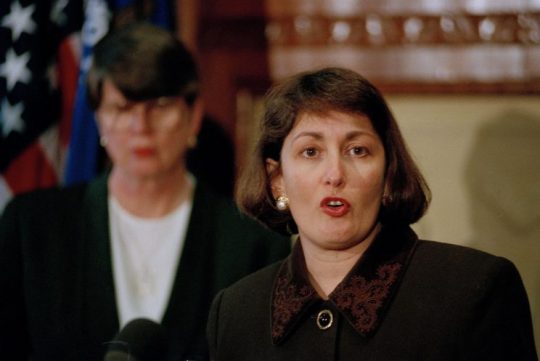
Jamie Gorelick, accompanied by Attorney General Janet Reno, meets reporters at the Justice Department in Washington, Feb. 23, 1994, after Reno announced that President Clinton will nominate Gorelick to become deputy attorney general. (Photo: Shayna Brennan/AP)
“Jamie crossed a lot of barriers without acting like she was crossing barriers,” says Seidman.
Gorelick vice chaired a Pentagon commission during her third year as an associate, then worked directly for the secretary of energy during the oil crisis of 1979. After another dozen years of private practice, she was elected president of the 80,000-member D.C. bar, cementing her insider status and “learn[ing],” as she once put it, “about this town in a way I hadn’t before.”
“I met people in large firms and in small firms,” Gorelick explained. “I came to see Washington as more of a village than an impenetrable city.”
When a Democrat finally returned to the White House, Gorelick followed. During the Clinton administration, she was never far from the center of action. One of Gorelick’s first tasks on the transition team was handling the confirmation process for Zoë Baird, Clinton’s nominee for attorney general. After Baird was derailed by Nannygate, Gorelick was assigned to Janet Reno, for whom the process went more smoothly. Gorelick went on to become general counsel at the Defense Department just in time to deal with the raging debate over gays in the military — and did a “masterly” job implementing Clinton’s controversial “don’t ask, don’t tell” policy, according to the 1995 Post profile, making the politically and legally dicey compromise work as well as it possibly could.

Next up was the Justice Department, where as deputy attorney general under the disorganized, distant Reno, Gorelick essentially ran the 100,000-employee operation, maintaining order during the Oklahoma City bombing and congressional inquiries into the Waco and Ruby Ridge confrontations. She presided over meetings with a gavel that read, “Because I said so.”
“Gorelick is strong where Reno is weak,” the Post wrote at the time. “She is a tough, demanding manager, exerting an influence over every policy and practice that emanates from the top.”
At the same time, Gorelick groomed a generation (or two) of influential D.C. lawyers, hiring them, advising them and helping to secure them jobs in both the public and private sectors. Two of her most prominent protégés were Beth Wilkinson, one of the top trial lawyers in the country, and Merrick Garland, Barack Obama’s ill-fated Supreme Court nominee.
After her eventful stint in the Clinton administration, Gorelick returned to private practice, where she seemed to actively court controversy, surfacing at some of the most contentious moments of the 2000s: as vice chairwoman at Fannie Mae, where she earned $25.6 million even as the giant mortgage lender was coming under attack for massive accounting failures; as a member of the 9/11 Commission, where she was (falsely) accused by conservatives, including then Attorney General John Ashcroft, of creating an intelligence “wall” that hindered counterterrorism agents in the years before the attacks; as lead defense counsel for Duke University in 2006 during the highly publicized rape scandal there; as a lobbyist for Sallie Mae, seeking to stymie student loan reform; and as a lawyer for BP after the catastrophic Deepwater Horizon oil spill of 2010
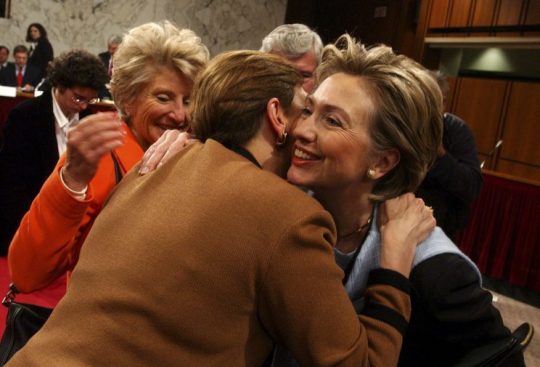
Sen. Hillary Clinton hugs Jamie Gorelick, a commission member, during the second public hearing of the 9/11 Commission. Rep. Jane Harman, D-Calif, is also pictured. (Photo: Tom Williams/Roll Call/Getty Images)
“The highest and best use of a lawyer’s talent is to represent people when they need you the most, which is often when there are governmental inquiries,” Gorelick tells Yahoo News. “If you look at the work I did for BP or for Duke in the lacrosse matter — or at the very first case I ever worked on, which was Jack Miller’s representation of Richard Nixon in the taking of Nixon’s papers — that’s what I do. That’s what my law firm does.”
***
Which brings us back to Kushner.
Democrats can’t comprehend why a fellow progressive like Gorelick would aid and abet President Trump’s slick son-in-law; conservatives can’t imagine that someone who dutifully served both Clintons — and was reportedly one of Obama’s top picks for FBI director — could possibly have Kushner’s best interests at heart.
What Gorelick’s bipartisan critics don’t understand is that she’s actually part of a long Washington tradition. And they don’t understand this because the Washington that gave rise to such a tradition no longer really exists.
Consider Williams. In 1954, he advised Joseph McCarthy after the Senate moved to censure the bullying anti-Communist for his conduct during public hearings; that same year, Williams also represented two Hollywood writers cited for contempt of Congress for refusing to answer questions about their own alleged Communist activities.

“Both Republicans and Democrats sought his friendship and counsel,” Albin Krebs wrote in his New York Times obituary of Williams, “and he seemed always to be in good standing with the occupant of the Oval Office.”
What made the old model work, David Ignatius has explained, was “the illusion that a Washington lawyer could somehow be above the fray.”
“Williams, Clifford and their fellow superlawyers hated the idea that they were mere partisans — in their minds, they were legal statesmen,” he wrote. “That lofty self-image allowed them to advise, simultaneously, all the various parties in a dispute — to be the president’s friend, and the Ways and Means chairman’s friend and the tax-lobbying corporate CEO’s friend.”
Today’s D.C. is different. Extreme polarization has forced everyone in Washington to see everything through a partisan lens. Power is more diffuse, amorphous. The economics of specialization have discouraged younger lawyers from becoming generalists like Gorelick, with her expertise in the fields of national security, law enforcement, ethics, regulation, politics and criminal litigation. And our obsessive 24/7 media ecosystem has put an end to the whole clubby, smoke-filled-room style of dealmaking that superlawyers such as Clifford thrived on.
Some of these changes are improvements; others aren’t. But they help to illuminate why Gorelick seems to confound so many observers, especially now that she’s counseling Kushner.
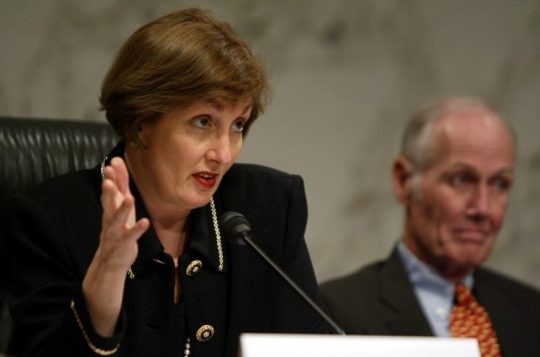
Gorelick questions CIA Director George Tenet during his testimony before the 9/11 Commission on Capitol Hill, April 14, 2004. in Washington. (Photo: Charles Dharapak/AP)
The reason Kushner came to Gorelick is clear enough: He and Ivanka wanted to work in Ivanka’s father’s White House — an unprecedented and potentially unethical situation — so who better to untangle the requisite corporate and legal knots than the last of the superlawyers? The fact that Gorelick is a dyed-in-the wool Democrat only lends more credibility to the arrangement.
“She’s a powerhouse,” says Amy Jeffress, a former federal prosecutor who worked with Gorelick at the Justice Department and has known her since childhood. “Very high-level clients are going to seek out someone of her stature” — regardless of political affiliation.
The reason Gorelick accepted Kushner as a client is also pretty clear: She relishes the hard cases.
“I’ve been doing this exact thing since 1975,” Gorelick told the Washingtonian. “You have to enjoy long odds. You have to enjoy trying to right the system, in that the government and Congress, the executive branch, the press have enormous power to bring criticism to bear and to sue, to indict — and often the case is overstated. The obligation of someone representing an individual or a company in those circumstances is to make sure that the other side of the argument is heard and that the result is fair. I enjoy that.”

Initially, the conflicts of interest surrounding Kushner were thorny enough; Gorelick spent two months late last year arranging for him to resign from his real estate and publishing businesses, shed most of his other assets and recuse himself from matters that would directly affect his remaining financial interests — just like “any other person entering public service,” according to Gorelick.
But now, with the recent Russia revelations, Gorelick’s client is swimming in much hotter legal waters.
So far, Gorelick has mostly just insisted that Kushner is ready and willing to explain himself to the FBI. “Mr. Kushner previously volunteered with Congress what he knows about these meetings,” she has told the press. “He will do the same if he is contacted in connection with any other inquiry.”
It will be interesting to watch how the Kushner case develops in the months ahead — and how Gorelick defends him.
“If Jared Kusher wants me to assist in these other matters, I will do so,” Gorelick says. “We are not going to refuse to represent him in the Russia probe because many of us in the law firm don’t agree with the Trump administration’s political views.”
Gorelick notes that, even as she counsels Trump’s family, she continues to work on cases involving climate change and sanctuary cities that directly contradict the president’s policies. “Jared and Ivanka hired me for my legal advice,” she says. “I’m not changing who I am.”
Despite the bipartisan chorus of criticism, many Beltway insiders insist that the president’s son-in-law went to see the right woman.
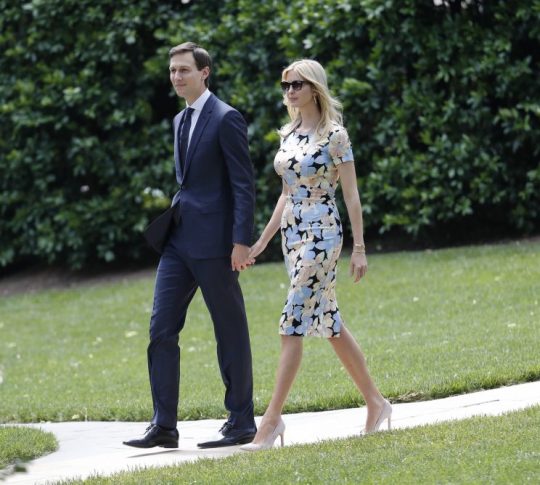
Ivanka Trump and Jared Kushner walk out to join President Trump aboard Marine One for the short trip to Andrews Air Force Base, Md., May 19, 2017. (Photo: Pablo Martinez Monsivais/AP)
Asked whether “it’s a good thing” that Gorelick is representing someone many Democrats seem to revile, Amy Jeffress doesn’t hesitate before answering.
“It’s a good thing for Kushner,” she says.
Evan Thomas goes one step further. “Some people get all snooty about Jamie taking the filthy lucre of the Trumps,” he says. “But look, it’s better from country’s perspective to have a savvy Washington hand defending Kusher someone who can still make deals that are sensitive to the national interest without selling out her client. It’s tricky, but if anybody can figure out the line here, it’s Jamie Gorelick.”
_____
Read more from Yahoo News:
Trump bluntly discards administration’s own ‘travel ban’ position
Al Gore: Trump’s decision to withdraw from Paris Agreement ‘threatens the ability of humanity to solve the climate crisis in time’
Trump assails London mayor over response to terror attacks
If Confederate statues could vote, Corey Stewart would be a shoo-in for the Virginia GOP primary
Photos: Bomb scare sparks stampede in Turin
#Jamie Gorelick#_revsp:Yahoo! News#_lmsid:a077000000CFoGyAAL#_uuid:760ceaab-f3a6-3e90-a9a4-9b99fb20274d#jared trump#_author:Andrew Romano
3 notes
·
View notes